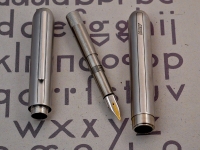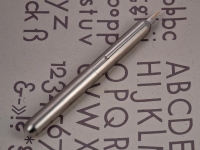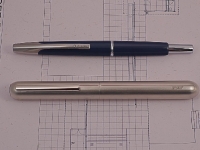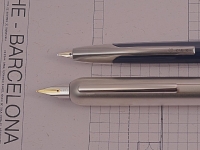It’s a newly minted year but I shan’t be going on about auld lang syne. I’m going to look back only a few days to this past Christmas and one gift in particular. I was given a lovely pen which I was not expecting in the least and it surprised the heck out of me. Earlier in the year I was spied examining this particular writing instrument finding it quite interesting and now, suddenly, I own it.
I have a tendency to ramble (although when I write these posts the words come out at a glacial pace) and with this pen I’m going to give myself an underlying structure for this and future reviews. I’ll keep things in a format like this:
1. Introduction
2. Appearance
3. Engineering and Features
4. Relevant Comparison
5. Usage Comments
6. Summary
So let’s give this a shot with the aforementioned pen: A Lamy Dialog 3 (or D3 for short.)

Bow House
Lamy pens often attract the adjective of “Bauhaus” when described. That famous design school (Staatliches Bauhaus) is well known for clean, machine age creations that are often associated with the aphorism “form follows function.” (Because Louis Sullivan is my favorite architect I must insert that he coined that phrase long before used in this context.) Lamys are smooth and modern and if you are familiar with the metal tubular furniture from Bauhaus designers you can see a similar rationale and resemblance. Pushing the envelope in this direction keeps all the new Lamy designs looking fresh.
Tubular Bells
The above brand of modernism can be seen in The Dialog 3 (even though it was designed by the Swiss Franco Clivio) and it is a pen that elicits strong reactions. It’s one of the least adorned pens I’ve seen and resembles a cigar tube. This design is broken only by the slender clip and access hole for the nib on one end. Textured and shiny metal is what you see and what you feel holding it. People could be confused and not even take it for a writing instrument.
I’ve read many comments on this pen and a large number of those are negative. Some have joked it needs an LED so it can become the penlight it was born to be. I’ve read even more colorful commentary on what it might look like (ahem, tampon). In my eyes I find the shape simple and compelling. I appreciate this unadorned mechanical appearance in many items from Porsche Design watches to Braun appliances so I’m predisposed to a favorable impression. Looking like some kind of tool is not terrible for what is really a tool to write.
Wienermobile without the Wheels
It used to be said Germans over engineered everything due to their skill and perfectionism. The gist of that idea is elegant engineering cuts no corners and exceeds all specifications. Lamy’s Dialog 3 fits well into that ethos. To begin with you can see the quality in its manufacturing on close inspection. You see smooth threads; polished internal parts, and well dampened movements. From the exquisitely knurled grip on the nib unit to the rotating half spheroid that acts as seal on the nib end the feeling of no cut corners comes on strong.
Of course there is a down side to this feeling of quality and that is weight. The pen is quite heavy which I can see turning a few people off. It feels like it was machined from a solid block of steel. Good? Bad? It’s a matter of preference, of course. It doesn’t bother me since I can adapt to massive or featherweight pretty easily.
There are three parts when the pen is disassembled (not counting the converter): The top section, the nib section, and the bottom section. The pen is separated by twisting the bottom past a detent in the direction that you would to retract the nib. Once apart the nib and feed come out in a unit which unscrews from the bottom of the pen. You can run water through or soak this for cleaning.
As if this pen wasn’t already complex enough the clip even has to show off. It’s on a spring tensioned hinge so it slips over fabric easily. Showier is how when the nib is extended the clip will actually move closer to the barrel and lock into place unusable. Even the most absent minded user won’t wind up with the nib staining any article of clothing.
East Meets West (Germany)
The obvious pen to compare the D3 to is the most popular retractable nib model on the market: The Pilot/Namiki VP or Vanishing Point (sometimes also called the Capless.) I have one from the 1980s which is similar to some of the current models in length and girth. You’ll see when it is placed next to the Dialog 3 there is quite a size difference. You’ll next notice the push button on the end of the Namiki which denotes a functional difference. This pen extends the nib by pushing this button like a click ballpoint. Compared to the D3 it has a simpler mechanism, a flap to close off the nib end, and a fixed clip.
In use the VP feels light as air in comparison to the D3 (mine has a plastic barrel but newer VP models have a brass one and weigh substantially more). As with all retractable point fountain pens you will have to deal with holding the clip end and some people with different gripping styles can find this problematic. Usability testing ends there since I can’t compare the much smaller Capless nib which was ground to italic with the Lamy’s medium.
Bullet with Butterfly Wings
What can I say? I like using this pen. It took a little time to get used to handling its thick and hefty body. I don’t find it uncomfortable though and it has a nice cool tactile feel on my fingers. It’s no nonsense, here to write, and don’t forget that.
The twist action to extend the nib is easy to get used to after a few instances of disassembling the pen when turned it too far but that is certainly not the worst learning curve in the world. Once opened it starts to write without hesitation. I’ve read some people have had their Dialog 3s dry up easily which hasn’t happened to me. I assume if that was a problem with the pen it has been fixed as production moved along or the inks I use are more resistant to drying than those of other folks.
The nib is nothing fancy. Two tone 14kt gold and slightly plain looking it won’t shock you but that is fitting to this pen. The range of points available will elicit a yawn as bold is about as fancy as it gets. Mine is the often hated medium and it creates a textbook example of that line width. So much so I won’t bother with an exemplar of the writing since you should be able to picture it well if you’ve ever used a medium nib. My example is very, very smooth with good flow in use, perhaps the smoothest nib I own. Once again I’ve read some people have flow problems which may have been fixed by the time my pen was made. The smooth, slightly soft nib makes writing with it is no chore and for a daily use pen I couldn’t ask for more.
Sometimes A Pen Is Just A Pen
I said this pen was polarizing before and I can’t stress “try before you buy” more in this case. You may hate what I find lovely about the Lamy Dialog 3. It’s big, solid, complex and these attributes could both be positives or negatives depending on your predilections. Over the last few weeks the D3 has performed reliably and I’ve enjoyed using it which about sums this all up.




